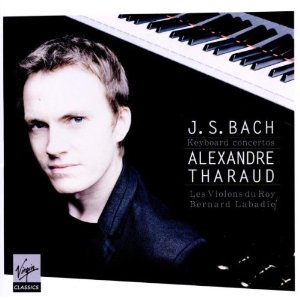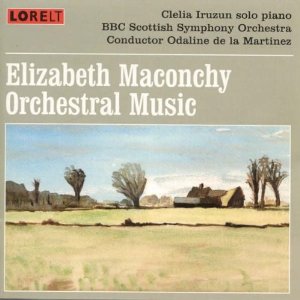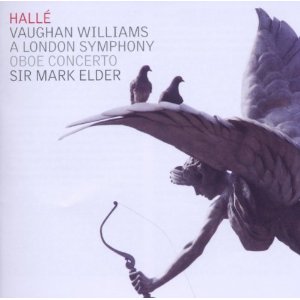Classical CDs Weekly: Bach, Elizabeth Maconchy, Vaughan Williams | reviews, news & interviews
Classical CDs Weekly: Bach, Elizabeth Maconchy, Vaughan Williams
Classical CDs Weekly: Bach, Elizabeth Maconchy, Vaughan Williams
Polished Bach concertos and two discs of British music
 Bach: Keyboard Concertos Alexandre Tharaud/Les Violons du Roy/Labadie (Virgin)
Bach: Keyboard Concertos Alexandre Tharaud/Les Violons du Roy/Labadie (Virgin)
Another disc of Bach keyboard concertos on a major label, following Ramin Bahrami’s brilliant, zingy set with Chailly on Decca. Alexandre Tharaud is teamed here with Les Violons du Roy, a Québécois chamber orchestra who use modern stringed instruments played with copies of period bows. Theirs is a distinctive sound, more astringent and incisive than that made by Chailly’s Gewandhaus players. So much so that Tharaud’s use of a piano instead of harpsichord could feel anachronistic. But he and director Bernard Labadie are wise enough to realize that these marvellous little concertos do sound better on a modern concert grand, in this case a rich-toned 1980s Yamaha. I love Tharaud’s solo recordings of Baroque repertoire – he’s produced magical recitals of Rameau, Bach and Scarlatti, but here he feels a little less involved. You’re left staggered by the dexterity and energy, but left a little emotionally cold. The prestidigitation dazzles but rarely moves, an impression not helped by slightly clinical, up-front recording.
But, even enjoyed at arms length, there are remarkable things here. Tharaud’s restraint in the tiny, eloquent slow movement of the F minor concerto is heartbreaking, and the ferocious accuracy of his playing in the finale of the G minor work dazzles. And he plays all four solo parts in the A minor concerto for four keyboards, each take recorded on the same piano positioned differently across the sound stage. The coordination is flawless, and you can’t help but smile.
Watch Alexandre Tharaud's Bach Concertos on Youtube:
 Elizabeth Maconchy: Orchestral Music BBC Scottish Symphony Orchestra/De la Martinez (Lorelt)
Elizabeth Maconchy: Orchestral Music BBC Scottish Symphony Orchestra/De la Martinez (Lorelt)
Elizabeth Maconchy (1907-1994) was a pupil of Vaughan Williams (see below) in the 1920s; and her composing career continued until the late 1980s. It’s a real surprise to discover how uncompromising and un-English the music on this disc sounds. This bracing, confrontational style does, however, co-exist with a certain dourness, and there are places when you wish that Maconchy’s music would loosen up and brighten up a little, the relentless gritty counterpoint a little like eating large bowls of dry muesli. Still, taken in smallish doses, there’s plenty to fascinate on this well-produced and annotated disc. Maconchy’s early four-movement suite, The Land, inspired by a Vita Sackville-West poem, starts brilliantly, unfolding bleakly with utter confidence. Maconchy’s palette is stark, utilitarian, with superb use made of brass and wind. You’d expect the two movements celebrating Spring and Summer to be lighter, fluffier affairs but they’re both edgy and full of foreboding. The Concertino for Piano and Chamber Orchestra, composed in 1928 is easier to assimilate; faster moving and more cleanly orchestrated. Brazilian pianist Clélia Iruzun is a confident soloist.
Maconchy’s Symphony for Double String Orchestra is tougher and more imposing. The antiphonal effects are well managed in this performance, and the slow fade in the final movement closes proceedings with understated eloquence. Only the monochrome Music for Woodwind and Brass oppresses rather than impresses. The ever-enterprising Odaline de la Martinez conducts, and she's a brilliant advocate for a genuine, underrated talent.
 Vaughan Williams: A London Symphony, Oboe Concerto Hallé Orchestra/Elder (Hallé)
Vaughan Williams: A London Symphony, Oboe Concerto Hallé Orchestra/Elder (Hallé)
First performed in its original version in 1914, Vaughan Williams’s London Symphony is worlds away from the European mainstream; this is no Mahler 9. But, seen as a slightly creaky and episodic sequence of brilliantly etched images, it’s a minor masterpiece. So much of Vaughan Williams’s music shouldn’t really work – it’s full of clunky cadences and sequences, often thickly orchestrated. But, somehow, this symphony succeeds, and if it’s performed as well as this you’ll forgive anything. The opening, a blatant steal from Debussy, is as hushed and spooky as it’s ever been. Big Ben sounds on harp and clarinet, and it’s hard not hear the subsequent fast music as a stodgy, foggy precursor to Gershwin’s An American in Paris. The composer’s suggestion that the slow movement evoked ‘Bloomsbury Square on a November afternoon’ doesn’t mean a great deal, but there are exquisite things here, especially the eruption of the Big Tune. The Scherzo steals from Petrushka and the last movement’s structure never quite holds together, the best thing about it being the elegiac, drawn-out coda. But, somehow, it all works, and good performances can leave me moist-eyed. As did this one. Sir Mark Elder’s live reading is polished to perfection, affectionate but never indulgent, and with a satisfying warmth to the Hallé’s string sound.
The unusual coupling is a studio performance of Vaughan Williams’s 1942 Oboe Concerto. Wistful, less assertive than the symphony, it’s far more than a short piece of cowpat pastoralism. It’s finely played by the orchestra’s principal oboe, Stéphane Rancourt, relishing the music’s gentle melancholy.
Buy
Explore topics
Share this article
Add comment
The future of Arts Journalism
You can stop theartsdesk.com closing!
We urgently need financing to survive. Our fundraising drive has thus far raised £49,000 but we need to reach £100,000 or we will be forced to close. Please contribute here: https://gofund.me/c3f6033d
And if you can forward this information to anyone who might assist, we’d be grateful.

Subscribe to theartsdesk.com
Thank you for continuing to read our work on theartsdesk.com. For unlimited access to every article in its entirety, including our archive of more than 15,000 pieces, we're asking for £5 per month or £40 per year. We feel it's a very good deal, and hope you do too.
To take a subscription now simply click here.
And if you're looking for that extra gift for a friend or family member, why not treat them to a theartsdesk.com gift subscription?
more Classical music
 Jansen, LSO, Pappano, Barbican review - profound and bracing emotional workouts
Great soloist, conductor and orchestra take Britten and Shostakovich to the edge
Jansen, LSO, Pappano, Barbican review - profound and bracing emotional workouts
Great soloist, conductor and orchestra take Britten and Shostakovich to the edge
 Jakub Hrůša and Friends in Concert, Royal Opera review - fleshcreep in two uneven halves
Bartók kept short, and a sprawling Dvořák choral ballad done as well as it could be
Jakub Hrůša and Friends in Concert, Royal Opera review - fleshcreep in two uneven halves
Bartók kept short, and a sprawling Dvořák choral ballad done as well as it could be
 Hadelich, BBC Philharmonic, Storgårds, Bridgewater Hall, Manchester review - youth, fate and pain
Prokofiev in the hands of a fine violinist has surely never sounded better
Hadelich, BBC Philharmonic, Storgårds, Bridgewater Hall, Manchester review - youth, fate and pain
Prokofiev in the hands of a fine violinist has surely never sounded better
 Monteverdi Choir, ORR, Heras-Casado, St Martin-in-the-Fields review - flames of joy and sorrow
First-rate soloists, choir and orchestra unite in a blazing Mozart Requiem
Monteverdi Choir, ORR, Heras-Casado, St Martin-in-the-Fields review - flames of joy and sorrow
First-rate soloists, choir and orchestra unite in a blazing Mozart Requiem
 Cho, LSO, Pappano, Barbican review - finely-focused stormy weather
Chameleonic Seong-Jin Cho is a match for the fine-tuning of the LSO’s Chief Conductor
Cho, LSO, Pappano, Barbican review - finely-focused stormy weather
Chameleonic Seong-Jin Cho is a match for the fine-tuning of the LSO’s Chief Conductor
 Classical CDs: Shrouds, silhouettes and superstition
Cello concertos, choral collections and a stunning tribute to a contemporary giant
Classical CDs: Shrouds, silhouettes and superstition
Cello concertos, choral collections and a stunning tribute to a contemporary giant
 Appl, Levickis, Wigmore Hall review - fun to the fore in cabaret and show songs
A relaxed evening of light-hearted fare, with the accordion offering unusual colours
Appl, Levickis, Wigmore Hall review - fun to the fore in cabaret and show songs
A relaxed evening of light-hearted fare, with the accordion offering unusual colours
 Lammermuir Festival 2025, Part 2 review - from the soaringly sublime to the zoologically ridiculous
Bigger than ever, and the quality remains astonishingly high
Lammermuir Festival 2025, Part 2 review - from the soaringly sublime to the zoologically ridiculous
Bigger than ever, and the quality remains astonishingly high
 BBC Proms: Ehnes, Sinfonia of London, Wilson review - aspects of love
Sensuous Ravel, and bittersweet Bernstein, on an amorous evening
BBC Proms: Ehnes, Sinfonia of London, Wilson review - aspects of love
Sensuous Ravel, and bittersweet Bernstein, on an amorous evening
 Presteigne Festival 2025 review - new music is centre stage in the Welsh Marches
Music by 30 living composers, with Eleanor Alberga topping the bill
Presteigne Festival 2025 review - new music is centre stage in the Welsh Marches
Music by 30 living composers, with Eleanor Alberga topping the bill
 Lammermuir Festival 2025 review - music with soul from the heart of East Lothian
Baroque splendour, and chamber-ensemble drama, amid history-haunted lands
Lammermuir Festival 2025 review - music with soul from the heart of East Lothian
Baroque splendour, and chamber-ensemble drama, amid history-haunted lands
 BBC Proms: Steinbacher, RPO, Petrenko / Sternath, BBCSO, Oramo review - double-bill mixed bag
Young pianist shines in Grieg but Bliss’s portentous cantata disappoints
BBC Proms: Steinbacher, RPO, Petrenko / Sternath, BBCSO, Oramo review - double-bill mixed bag
Young pianist shines in Grieg but Bliss’s portentous cantata disappoints

Comments
Elizabeth Maconchy died in
Apologies, and thanks for